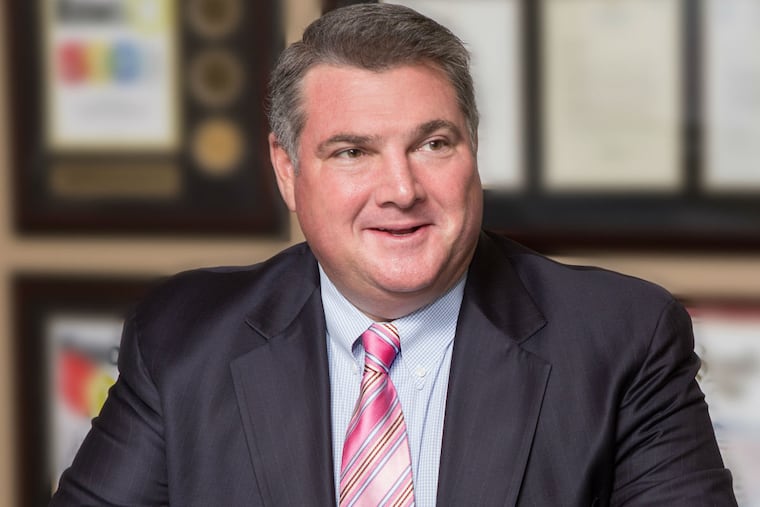One employer's view of the 'Are you better off?' test
It's time to pick a new president, and review that familiar question: Are we better off than eight years ago?

It's time to pick a new president, and review that familiar question: Are we better off than eight years ago?
Democrats brag about low inflation, cheap energy, cheap loans (if you can get one), and low unemployment. Republicans say too many people don't work, investment isn't profitable enough, and the economy is growing too slowly.
There's no more basic measure than jobs. So I asked the boss of one of the nation's biggest employers - Steve Jones, chief executive of the newly consolidated Conshohocken- and Santa Ana, Calif.-based AlliedUniversal - how hiring has changed since President Obama was elected amid the 2008 financial meltdown.
In that recession, with 1 in 10 Americans who wanted a job unable to find one, "it was easy to find great people," said Jones, whose company supplies 140,000 guards and janitors and surveillance to big landlords and firms.
But with fewer than 1 in 20 out of a job now, "it's a challenge to find quality people in today's economy," he added. "Service jobs are plentiful."
From Amazon to McDonald's to Walmart, big companies have boosted wages, as entry-level posts go begging.
And not just entry-level. "The education requirement is going up because we are using more technology. The days of hiring anybody to stand in front of a building are long gone. We are operating safety communications systems, emergency evacuation systems, access control systems," Jones told me. "We are in a battle for entry-level to midlevel talent every day."
Democrats want to raise the minimum wage to $15 an hour. The Service Employees International Union wants to push Philadelphia janitor wages higher, as it has in New York.
"We're adjusting to it," Jones said. "In New York, Washington, and San Francisco, you can make the argument $15 is on the low end."
Who uses whom?
Jones also gave insight into the role that hedge funds play in the lucrative (for bosses and bankers) and disruptive (for customers and workers) sport of remaking corporate America.
At Dow Chemical, DuPont Co., Heinz, Mondelez, Pep Boys, and other big firms lately forced to cut costs by relentless hedge funds, it's easy to see them as greedy billionaires squeezing workers.
Hillary Clinton and Donald Trump both say hedge-fund bosses - who include some of their biggest financial backers - ought to pay more taxes.
But Jones reminded me that managers use hedge funds the way they long used banks or public financing: as a way to build their empires.
Jones said he learned by watching Bill Whitmore, the former police officer who built South Philly's old SpectraGuard, through a string of investor-funded sales and mergers, into AlliedBarton, before joining with Jones' company to form Allied Universal.
"Bill was very successful through three private-equity partners. He's done well by them," Jones said. "AlliedBarton used private equity to grow itself into a tremendous force.
"At Universal, we used Bill's playbook. We were privately held by myself and a business partner till 2011. Once we brought in private equity, we became significantly bigger. We had the financing.
"My first private-equity partner, Partners Group, they loved the business. They stayed in [as minority owner] after we brought in Warburg Pincus.
"Now, with Allied Universal, we get Wendel," the French investor group that was AlliedBarton's largest owner and remains a big shareholder of the combined firm.
Whitmore now serves as nonexecutive board chairman; we don't know how rich he made himself because the company remains private. Conshohocken-based CFO Bill Torzolini and other AlliedBarton veterans are staying on to help Jones run the combined company.
Allied Universal, as the largest private security company in North America, figures it controls 20 percent of the U.S. guard market. Is it going into foreign markets? "We're in Canada. We're looking at some others," Jones says.
But there's still opportunity at home for Allied Universal's security-tech business, based in Dallas. "We have the analytics developed so we can analyze video" and identify potential troublemakers."
Isn't all that image-and-data power a threat to people's privacy? "The cameras are placed in general public areas. Lobbies of office buildings. Corridors between stores and malls. They are there to look for suspicious activity and record when stuff does happen," Jones told me.
Will robot security replace human workers? "We haven't seen technology displace employees yet. It's very small," Jones said. "We have seen technology enhance security. Someone still has to respond to that emergency. Somebody has to watch those cameras."
215-854-5194@PhillyJoeD